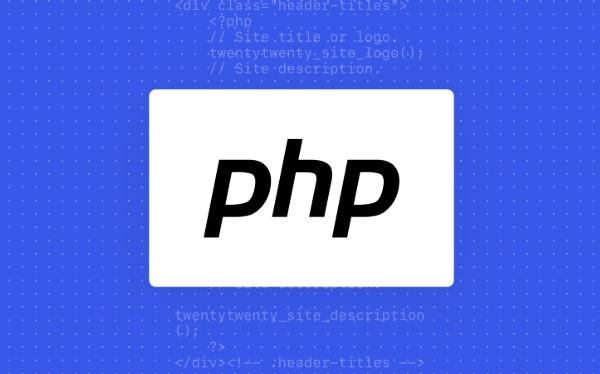Use prepared statements in PHP mainly to prevent SQL injection attacks, improve performance, make the code clearer and easier to debug. 1. It effectively prevents SQL injection through parameterized queries, ensuring that user input is always processed as data rather than SQL logic; 2. Preprocessing statements only need to be compiled once when executed multiple times, significantly improving execution efficiency, especially suitable for batch operations; 3. Parameter binding supports position and named placeholders, separates SQL and data, and enhances code readability and maintenance; 4. Errors can be exposed in advance in the prepare phase, and exceptions can be handled uniformly by setting error mode, which helps to quickly debug.

Use prepared statements in PHP, mainly to execute SQL queries safely and efficiently . Especially when processing user input, prepared statements can effectively prevent SQL injection attacks, while also improving the performance and readability of database operations.

The following is a few practical application scenarios to explain why you should use it.
1. Prevent SQL injection attacks
SQL injection is a common attack method where attackers construct malicious input and tamper with SQL query logic to obtain or modify data you do not want them to touch.

For example:
If you splice SQL queries like this:

$username = $_POST['username']; $password = $_POST['password']; $sql = "SELECT * FROM users WHERE username = '$username' AND password = '$password'";
An attacker can enter ' OR '1'='1 , which causes the query to become:
SELECT * FROM users WHERE username = '' OR '1'='1' AND password = ''
The result is bypassing login verification.
Using prepared statements:
$stmt = $pdo->prepare("SELECT * FROM users WHERE username = ? AND password = ?");
$stmt->execute([$username, $password]);At this time, no matter what the user inputs, it will be processed as a string, which will not affect the structure of SQL and fundamentally prevent injection.
2. Improve performance: more efficient execution after multiple times
prepared statements will be parsed and compiled by the database during the first execution. After execution again, you only need to pass in new parameters, and there is no need to repeatedly parse SQL statements.
This is useful for situations where the same SQL template needs to be executed multiple times, but with different parameters.
For example, batch insertion of data:
$stmt = $pdo->prepare("INSERT INTO users (name, email) VALUES (?, ?)");
foreach ($users as $user) {
$stmt->execute([$user['name'], $user['email']]);
}Compared to splicing SQL strings and executing them each time, this method is more efficient and safer.
3. Parameter binding makes the code clearer
Using parameter binding, you can separate variables and SQL statements to make the code easier to read and maintain.
PHP supports two forms of parameter binding:
- Position placeholder : Use
?to represent the parameter position and pass the values in order. - Naming placeholders : Name parameters in the form of
:name, suitable for situations where there are many parameters or more complex logic.
For example:
$stmt = $pdo->prepare("SELECT * FROM users WHERE id = :id AND status = :status");
$stmt->execute(['id' => 1, 'status' => 'active']);This writing method is not only clear, but also convenient for debugging and reusing.
4. Better error location and debugging support
When using prepared statements, if SQL has syntax problems, an error will usually be reported in the prepare stage, rather than waiting until execution to discover it. This is helpful for quickly positioning problems in the development stage.
In addition, extensions such as PDO or MySQLi support setting error modes, such as throwing exceptions, which facilitate unified handling of errors.
$pdo->setAttribute(PDO::ATTR_ERRMODE, PDO::ERRMODE_EXCEPTION);
In general, using prepared statements not only improves application security, but also improves performance and code quality. It should be preferred for any database operation involving user input.
Basically that's it.
The above is the detailed content of Why use prepared statements in PHP. For more information, please follow other related articles on the PHP Chinese website!

Hot AI Tools

Undress AI Tool
Undress images for free

Undresser.AI Undress
AI-powered app for creating realistic nude photos

AI Clothes Remover
Online AI tool for removing clothes from photos.

Clothoff.io
AI clothes remover

Video Face Swap
Swap faces in any video effortlessly with our completely free AI face swap tool!

Hot Article

Hot Tools

Notepad++7.3.1
Easy-to-use and free code editor

SublimeText3 Chinese version
Chinese version, very easy to use

Zend Studio 13.0.1
Powerful PHP integrated development environment

Dreamweaver CS6
Visual web development tools

SublimeText3 Mac version
God-level code editing software (SublimeText3)

Hot Topics
 How Do Generators Work in PHP?
Jul 11, 2025 am 03:12 AM
How Do Generators Work in PHP?
Jul 11, 2025 am 03:12 AM
AgeneratorinPHPisamemory-efficientwaytoiterateoverlargedatasetsbyyieldingvaluesoneatatimeinsteadofreturningthemallatonce.1.Generatorsusetheyieldkeywordtoproducevaluesondemand,reducingmemoryusage.2.Theyareusefulforhandlingbigloops,readinglargefiles,or
 How to access a character in a string by index in PHP
Jul 12, 2025 am 03:15 AM
How to access a character in a string by index in PHP
Jul 12, 2025 am 03:15 AM
In PHP, you can use square brackets or curly braces to obtain string specific index characters, but square brackets are recommended; the index starts from 0, and the access outside the range returns a null value and cannot be assigned a value; mb_substr is required to handle multi-byte characters. For example: $str="hello";echo$str[0]; output h; and Chinese characters such as mb_substr($str,1,1) need to obtain the correct result; in actual applications, the length of the string should be checked before looping, dynamic strings need to be verified for validity, and multilingual projects recommend using multi-byte security functions uniformly.
 How to prevent session hijacking in PHP?
Jul 11, 2025 am 03:15 AM
How to prevent session hijacking in PHP?
Jul 11, 2025 am 03:15 AM
To prevent session hijacking in PHP, the following measures need to be taken: 1. Use HTTPS to encrypt the transmission and set session.cookie_secure=1 in php.ini; 2. Set the security cookie attributes, including httponly, secure and samesite; 3. Call session_regenerate_id(true) when the user logs in or permissions change to change to change the SessionID; 4. Limit the Session life cycle, reasonably configure gc_maxlifetime and record the user's activity time; 5. Prohibit exposing the SessionID to the URL, and set session.use_only
 How to URL encode a string in PHP with urlencode
Jul 11, 2025 am 03:22 AM
How to URL encode a string in PHP with urlencode
Jul 11, 2025 am 03:22 AM
The urlencode() function is used to encode strings into URL-safe formats, where non-alphanumeric characters (except -, _, and .) are replaced with a percent sign followed by a two-digit hexadecimal number. For example, spaces are converted to signs, exclamation marks are converted to!, and Chinese characters are converted to their UTF-8 encoding form. When using, only the parameter values ??should be encoded, not the entire URL, to avoid damaging the URL structure. For other parts of the URL, such as path segments, the rawurlencode() function should be used, which converts the space to . When processing array parameters, you can use http_build_query() to automatically encode, or manually call urlencode() on each value to ensure safe transfer of data. just
 PHP get the first N characters of a string
Jul 11, 2025 am 03:17 AM
PHP get the first N characters of a string
Jul 11, 2025 am 03:17 AM
You can use substr() or mb_substr() to get the first N characters in PHP. The specific steps are as follows: 1. Use substr($string,0,N) to intercept the first N characters, which is suitable for ASCII characters and is simple and efficient; 2. When processing multi-byte characters (such as Chinese), mb_substr($string,0,N,'UTF-8'), and ensure that mbstring extension is enabled; 3. If the string contains HTML or whitespace characters, you should first use strip_tags() to remove the tags and trim() to clean the spaces, and then intercept them to ensure the results are clean.
 PHP get the last N characters of a string
Jul 11, 2025 am 03:17 AM
PHP get the last N characters of a string
Jul 11, 2025 am 03:17 AM
There are two main ways to get the last N characters of a string in PHP: 1. Use the substr() function to intercept through the negative starting position, which is suitable for single-byte characters; 2. Use the mb_substr() function to support multilingual and UTF-8 encoding to avoid truncating non-English characters; 3. Optionally determine whether the string length is sufficient to handle boundary situations; 4. It is not recommended to use strrev() substr() combination method because it is not safe and inefficient for multi-byte characters.
 How to set and get session variables in PHP?
Jul 12, 2025 am 03:10 AM
How to set and get session variables in PHP?
Jul 12, 2025 am 03:10 AM
To set and get session variables in PHP, you must first always call session_start() at the top of the script to start the session. 1. When setting session variables, use $_SESSION hyperglobal array to assign values ??to specific keys, such as $_SESSION['username']='john_doe'; it can store strings, numbers, arrays and even objects, but avoid storing too much data to avoid affecting performance. 2. When obtaining session variables, you need to call session_start() first, and then access the $_SESSION array through the key, such as echo$_SESSION['username']; it is recommended to use isset() to check whether the variable exists to avoid errors
 How to prevent SQL injection in PHP
Jul 12, 2025 am 03:02 AM
How to prevent SQL injection in PHP
Jul 12, 2025 am 03:02 AM
Key methods to prevent SQL injection in PHP include: 1. Use preprocessing statements (such as PDO or MySQLi) to separate SQL code and data; 2. Turn off simulated preprocessing mode to ensure true preprocessing; 3. Filter and verify user input, such as using is_numeric() and filter_var(); 4. Avoid directly splicing SQL strings and use parameter binding instead; 5. Turn off error display in the production environment and record error logs. These measures comprehensively prevent the risk of SQL injection from mechanisms and details.






